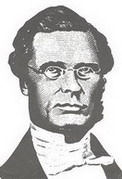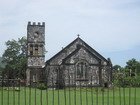George William Gordon
Voice of the People

If he were alive today, George William Gordon would simply be described as a "brown man". But the plantation age, into which he was born in 1815, gave him a specific racial designation according to how many degrees of white he had in his blood.
The blanket name given to persons of mixed black and white blood was "coloured". More specifically, a mulatto was the offspring of full black and full white. A quadroon was the child of mulatto and white.
George William Gordon was a mustee, the child of a quadroon slave and her white master.
With so much white blood in his geneology, Gordon had a much higher social status than blacks and most other coloureds.
Gordon was born in St. Andrew on Cherry Gardens Estate (now a swanky residential neighbourhood). As a boy, he taught himself reading, writing and book-keeping. He was freed by his father, and sent to live in
St. Elizabeth with his godfather James Daly, a successful businessman in
Black River. Young Gordon turned out to be a natural at business, and in no time became a successful produce dealer and a large landowner.
With his business success and the social privileges associated with his colour, George William Gordon could probably have lived a very comfortable life without challenging the status quo. But from as early as in his twenties, he became passionate about religion, and about the rights of the coloureds and blacks among whom he lived.
In 1830, after a long struggle in Jamaica and England, free blacks and free coloureds had been given the right to vote, and enjoy all the rights and privileges of whites, as long as they had a certain amount of property. So naturally, the plantocracy tried to prevent blacks and coloureds from amassing any property. This is what Jamaicans call "bad mind and fight 'gainst"!
Conditions after Emancipation
After emancipation in 1838, many ex-slaves settled as cultivators on small plots of land. The supply of labour to the sugar estates dried up, and the planters tried their best to frustrate the peasantry who tried to make a living away from the plantations.
They refused to allow settlers to rent or squat on their land. The local justice system, which was administered by the planters themselves, was extremely harsh in its dealings with the settlers. To top it all, the House of Assembly (which had been the law-making body in Jamaica for nearly 200 years) seemed to speak only with the voice of the ruling class.
Until George William Gordon came along. Shaking up things that folks didn't want shaken.
George William Gordon Speaks Out
In 1844, Gordon was elected to the Assembly, and at age 29 began to speak up relentlessly for the blacks and coloureds. After his first term he became so unpopular with the establishment that he lost his seat.
He bought up old sugar estates, rented out land to peasant farmers, advanced them money to grow crops, and then sold their produce. This gave them an an income and an alternative to working on the plantations for pitifully low wages. As you can imagine, this did not endear him to the planter class.
George William Gordon was originally a baptised Anglican, the church of the ruling class. He later became a Baptist, and then a Native Baptist (considered a lower class religion) in 1861, setting up chapels in Kingston and St. Thomas. The idea of a man of Gordon's status leaving the Anglican Church to become a Native Baptist was almost unheard of! This antagonised the Anglican Church, the plantocracy, the Governor (Edward Eyre) and the Assembly.
Gordon ordained Paul Bogle as a deacon in his Native Baptist Church, and from then on strong religious and political ties were formed between the two men.
In 1863, Gordon was re-elected to the Assembly, representing
St. Thomas-in-the-East. His support came mainly from small settlers, led by Paul Bogle and his followers.
He organised and mobilised people all over Jamaica, working for an increase in the number of persons eligible to vote. He knew this was a must if the interests of the small man were ever to be treated with importance. His enemies accused him of giving cattle to his supporters, so that by paying taxes on the livestock, they would be eligible to vote!
Conditions in 1865
In January 1865, the Revd. Dr. Underhill, a Baptist minister in England who had lived in Jamaica, sent a letter to the British Secretary of State for the colonies. In this "Underhill Letter" he outlined the deplorable social and economic conditions affecting the Jamaican black population, and made suggestions for improvements which could be made by the government.
A copy of the letter was published in the newspapers, following which public meetings called "Underhill Meetings" were held throughout the island, providing an opportunity for people to speak out against the government. George William Gordon (no surprise) presided over many of these meetings, in the process making a very personal enemy of Governor Eyre.
Perhaps encouraged by Gordon, the poor people of St. Ann sent a letter to Queen Victoria. They complained that the planters would not rent them land, and that they were starving. They asked the Queen to lease them unused Crown lands.
Governor Eyre forwarded the letter, along with his own opinions, which were, of course, sympathetic to the planters.
The Colonial Office took Eyre's position. The reply they drafted ( called The Queen's Advice) told the people to give up ideas of working for themselves, accept their duty to work for the planters, and try to improve their condition through hard work.
This reply was not what people wanted to hear. It pushed resentment against the establishment to the boiling point. Gordon continued to hold protest meetings across Jamaica.
In October 1865, when two of Paul Bogle's supporters were arrested in Morant Bay, the protest that followed became known as the Morant Bay Rebellion. It was an explosion of all the economic, social and political grievances that were being suffered by the people.
Gordon's demise
Governor Eyre used the Morant Bay Rebellion as an excuse to get rid of Gordon. While soldiers were inflicting brutal violence on the people of St. Thomas, the Governor had Gordon arrested at his home in Kingston.
Gordon was taken to St. Thomas by ship, charged with treason, sedition and complicity with the rebels. He was hanged on October 23, 1865, two days before Bogle was captured and hanged. Before his death, Bogle insisted that Gordon had played no part in planning the events leading to the rebellion.
At a time when the majority had no voice, George William Gordon became their voice - encouraging them to see themselves as having a right to land, a right to work for decent wages, a right to a fair justice system, and a right to vote.
After the rebellion, Jamaica reverted to direct rule from Britain. A new governor was appointed, and began to institute the reforms for which Gordon had fought all his life.
George William Gordon was declared a National Hero of Jamaica in 1969.
Return from George William Gordon to Home Page









